 Any discussion of hygiene – whether in an older adult or anyone else for that matter – is an admittedly subjective discussion. It is not just about taking a daily bath or shower. In fact, in many other parts of the world, a daily cleansing is considered a bit excessive, and some people of earlier generations did not necessarily grow up on the daily dousing we call personal hygiene. Everyone potentially has their own take on how frequently they wish to bathe, but hygiene also can be an indicator that something else is not quite right in an older adult.
Any discussion of hygiene – whether in an older adult or anyone else for that matter – is an admittedly subjective discussion. It is not just about taking a daily bath or shower. In fact, in many other parts of the world, a daily cleansing is considered a bit excessive, and some people of earlier generations did not necessarily grow up on the daily dousing we call personal hygiene. Everyone potentially has their own take on how frequently they wish to bathe, but hygiene also can be an indicator that something else is not quite right in an older adult.
When I get a call from a client who is concerned about their older loved one’s hygiene, I start by simply asking if this is a recent change from old habits or if it simply the way they always have been. If it is just the way the habit has always been, then it will not be easily changed…if, in fact, it even should be changed. Old habits are deeply ingrained. But a change in personal habits can be the sign of something else at work.
In an earlier post, I had pointed out that loss in appetite can be a warning sign of depression. The same holds for an older adult who has lost interest in how they look or how they smell. Depression is a bigger issue than hygiene, and in fact, if the older adult addresses the depression with talk therapy or medication, if indicated, they may find a renewed interest in self-care and hygiene.
And as with appetite as I addressed in the last posting, a change in hygiene can simply be a product of the older adult’s diminished ability to smell what you as a caregiver may find offensive. Conversely, you may find that your older loved one has dumped excessive amounts of cologne on themselves, because they cannot tell that they have given themselves an overdose of the good smelling stuff. Regardless, any discussion you may have with the older adult about something as personal as how they smell should be a very sensitive discussion.
Your older loved one also may also be finding it difficult to navigate the bath like they used to because of their diminished agility. And modesty may preclude them from asking for help. So if this is the case, consider enlisting the help of third parties like home care aids who will not be as threatening to their sense of propriety.
Forgetting to shower or bathe can also be a sign of a larger pattern of forgetfulness, so try to assess hygiene against the “big picture.” Does your older loved one also miss appointments or forget to pick up their clothes from the cleaners? Maybe suggesting a calendar with dates filled-in with the “things to do” can be an assist, because we all can forget things. If the forgetfulness, however, is part of a greater disorientation, be alert to early onset dementia. Even if this forgetting is part of a dementia, don’t immediately push the Alzheimer’s panic button. Mild dementia can be exacerbated by poor sleep or even a medication that has a side effect of confusion. Diphenhydramine (branded Benadryl), an ingredient in a lot of over the counter medications, can precipitate some amount of forgetfulness in a person of any age.
Charlotte Bishop is a Geriatric Care Manager and founder of Creative Case Management, certified professionals who are geriatric advocates, resources, counselors and friends to older adults and their families in metropolitan Chicago. Please email your questions to ccbishop@creativecasemanagement.com.



